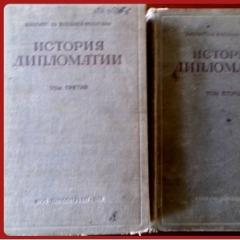Russian State Humanitarian University. Ineffective RSU recognized as a sought-after university Rating of Russian State Humanitarian University
schedule Operating mode:
Mon., Tue., Wed., Thu., Fri. from 09:00 to 17:45
Latest reviews from RSUH
Dmitry Rasov 21:00 05/31/2013The choice for this university fell when choosing a specialty. Literally everything came together - the specialty, the curriculum, the passing grades and the cost of training in the commercial department. I can’t say that it was incredibly difficult to get in, but the competition was quite decent. Both the points received for the Unified State Exam and the internal entrance exam were of great importance (not all faculties have such an exam, moreover, it is no more difficult than the Unified State Exam and is compiled exclusively about the school curriculum...
Elena Borzova 13:13 04/27/2013
My husband studied at this university. I studied full-time. RSUH has its main building in Moscow, and a branch in the Moscow region, the village of Fryazino; training took place in both buildings. I studied for a fee, it is very difficult to enroll in the free department, there is a big competition, about 30 people per place, and there are a huge number of people who want to get into this university, also the Faculty of Law is very popular at the moment. As for the male teaching staff...
Gallery of the Russian State University for the Humanities



general information
Federal State Budgetary Educational Institution of Higher Education "Russian State Humanitarian University"
University Reviews
Moscow universities that have budget places in the field of Linguistics. Admission 2013: list of Unified State Examinations, passing score, number of budget places and tuition fees.
About RSUH
The Russian State University for the Humanities is a relatively young university, which during its existence has already become a leader among other universities for the humanities and has reached the peak of popularity among applicants.
Education at the Russian State University for the Humanities
The university implements educational programs for professional education at all levels.
Students can receive secondary vocational education at the University's Humanitarian College. Basic training in secondary vocational education is offered in the following specialties: “Design” (by industry), “Tourism”, “Finance”, “Technique and art of photography”, “Advertising”, “Documentation management and archival science”; in-depth preparation of secondary vocational education – in the specialty “Law and organization of social security”
Graduates of the 9th and 11th grades are admitted to the Humanitarian College. Training is conducted full-time, on a paid basis. The College employs the best teachers of the university, and a mandatory element of the educational process is practical training at those enterprises and firms with which the university has entered into a mutually beneficial agreement.
After receiving higher education at the specialist or master's level, students can continue their studies at the Russian State University for the Humanities under postgraduate programs for training scientific and pedagogical personnel to obtain the qualification of a “teacher-researcher” and subsequently write and defend a Ph.D. dissertation.
Upon completion of the first higher education at the university, you can obtain a second higher education in order to increase your competitiveness when applying for vacant positions.
Pre-university education of schoolchildren and applicants at the Russian State University for the Humanities
The university has a Pre-University and Lyceum classes, where students in grades 10-11 can receive a general secondary education. Studying at the Pre-University and Lyceum classes of the Russian State University for the Humanities not only allows you to study the humanities in depth and prepare for entering a university, but also provides a unique opportunity to adapt to the university educational environment.
Lyceum classes of the Russian State University for the Humanities have been working under the Russian Humanitarian Lyceum program since 1990, in collaboration with a number of Moscow schools, implementing a two-year education model with international linguistic and social and humanitarian profiles. Tuition is paid, admission is based on the results of entrance tests.
Pre-university is a joint project of the Moscow Department of Education and the Russian State University for the Humanities to organize specialized education for students in the 10th and 11th grades of high school, providing psychological support for the educational process, which takes into account the individual characteristics of the personality development of each teenager. Education on a budget basis, enrollment based on competitive selection.
In order to successfully pass the Unified State Exam and university entrance tests, applicants can enroll in university preparatory courses. In these courses, schoolchildren in grades 10-11 receive fundamental training in Russian language and literature, history, biology, social studies, foreign languages, mathematics and computer science, as well as in creative competition and subjects of additional entrance examinations.
Features of studying at the Russian State University for the Humanities
RSUH provides quality education thanks to:
- highly qualified teaching staff, among whom are scientists and specialists of the Russian Academy of Sciences, researchers from various centers who combine student education and various research, as well as employees of successful enterprises who share professional experience with students;
- developed scientific activities in the field of social and human sciences, which are carried out by students and teachers of the university;
- active international activities carried out at the university thanks to 250 mutually beneficial agreements concluded between the university and foreign universities, which allow students to receive double diplomas and participate in internships in the best world-famous universities;
- affordable education, which allows some students to study completely free of charge and receive scholarships, while others can study on a contract basis, but pay a relatively small amount;
- introduction of modern multimedia into the educational process;
- the scientific library of the university, which is one of the largest university libraries in Russia and fully provides students with all the necessary literature in all disciplines studied;
- a rich student life, which allows students to develop their talents and become more relaxed and self-confident, thanks to holidays, evenings, competitions and participation in the student trade union committee;
- the work of the University Student Employment Service, thanks to which many university graduates are employed in their specialty while still studying at the university.
At our university, in addition to institutes, faculties, departments, there are international educational and scientific centers where you can receive an international specialization in parallel with your main specialty: at the Russian-American Center for Biblical Studies and Jewish Studies - in the history and culture of the Jewish people, the Yiddish and Hebrew, in the Russian-Swedish Center - in Swedish language, history, culture, literature of Sweden, etc. Along with a diploma of higher education, students of several specialties and areas can receive a certificate of additional professional qualifications, for example, "secretary assistant" , “computer scientist-programmer”, and if you are fluent in a foreign language and manage to pass the exam in a general foreign language course ahead of schedule, you will have the opportunity to undergo in-depth language training to receive a certificate of “referent-translator” in your specialty or a full university course of a second foreign language language.
The scientific library of the Russian State University for the Humanities has rich collections and an electronic catalogue. In the Media Library, users receive prompt and high-quality access to the university’s information resources and the information service of global networks.
Museum of the Russian State University for the Humanities Much attention is paid to education through art. Therefore, a Museum Center has been created at the Russian State University for the Humanities, and the library, halls and auditoriums are decorated with paintings and sculptures.
The educational and art museum presents casts from the most famous monuments of sculpture and architecture from the Ancient East and antiquity to the Middle Ages and the Renaissance. The museum of unofficial art of the 50-70s of the twentieth century “Other Art” presents the richest collection of L.P. Talochkina. Those of you who are interested in art will be able to attend lectures organized by the Museum Center, participate in exhibition projects, and attend unique master classes by famous artists. For example, it was at our university that Mikhail Shemyakin held his first master class in Russia.
If you have a penchant for research work, then you are given a wide opportunity to engage in issues that interest you in student circles, participate in scientific conferences, round tables, and symposia.
At our university you can get a second higher education. At the Higher School of Restoration, on a paid basis, you can study externally in the specialty “museology” and master one of the rare specializations in the restoration of museum objects.
Teachers of the Russian State University for the Humanities And finally, about those who will teach you. The university has more than 600 full-time teachers and about 400 part-time teachers. Among them are 70 academicians and corresponding members of Russian (RAN, RANS, RAO), international and foreign academies, 214 doctors of science and 573 candidates of science. These are well-known specialists, young talented scientists, representatives of various scientific schools, directions, authors of unique courses and special courses. Information about them is given in the directory “Who is who at the Russian State University for the Humanities,” from which you can get complete information about the teachers you are interested in and the topics of the lecture courses they give.
The results of the latest rating turned out to be both unexpected and sensational. For example, it is quite expected that the top five higher educational institutions, the most popular among the winners of school Olympiads, and, therefore, the strongest in terms of contingent, included Lomonosov Moscow State University; National Research University - Higher School of Economics (HSE); Physics and Technology; Bauman MSTU and MGIMO.
However, completely unexpected in the context of the pandemonium with universities “with signs of inefficiency”, identified by the monitoring of the Ministry of Education and Science, was the presence of the Russian State University for the Humanities in the top ten (10th place against 16 last year) and the former Lenped in the top twenty (20th place) .
To a certain extent, this is a question of the criteria by which universities were assessed, he emphasized: “When we talked about the need for monitoring, we noted the need for 50 indicators. And the five chosen do not give the full picture.” The main identifying signs of efficiency and inefficiency, he emphasized to MK, can only be two:
The demand for universities in the regional labor market (but then up to half of Moscow and St. Petersburg universities will be ineffective, since their graduates, as a rule, remain in these cities and often cannot find work) and independent assessment of graduates’ knowledge. (It should be organized by the Ministry of Education and Science, and state exams in at least the main 5-6 basic subjects should be taken by teachers from other universities). But unfortunately, this was not done, although this is not the first year that we have been raising the question of the need for all-Russian monitoring of the employment and income of university graduates. When it appears, it will be difficult to talk about bias in assessments. And while he is gone, the Ministry of Education and Science will constantly be substituted.
However, strong universities, which are now being joined by ineffective universities, do not benefit from this either, he said: “It is too expensive for them to hire new, high-quality teachers and retrain students. And no one is allocating additional funds for this!”
Meanwhile, an ineffective university does not at all mean a small university: RGTEU, for example, has 80 thousand students, recalled RSR General Secretary Olga Kashirina - and this is several times more than in the super-efficient physics and technical institutes or MGIMO.
And more about the Russian State University for the Humanities. According to Kuzminov, “this is a strong university with its own school. Science there may not be very strong, but financing it is the task of the state. And it still hasn't been resolved. The main problem of the Russian State University for the Humanities is 5.5 meters per student. But this is a sign of the university’s demand, and also a signal to the founder (i.e., the state) that the university needs a new, additional building. The university itself cannot buy it today. This is the task of the state. And the university just needs to reconsider its activities and refocus them on traditionally strong areas.” The rector of the National Research University Higher School of Economics also emphasized that his university “does not and did not have any intention of annexing the Russian State University for the Humanities. And the Ministry of Education and Science knows about this.”
The "RGGU" request is redirected here. See also other meanings. Russian State Humanitarian University (RGGU) Founded 1991 Rector ... Wikipedia
Russian State University for the Humanities (Miusskaya Square, 6). Established in March 1991 on the basis of the Moscow Historical and Archival Institute (MGIAI, since 1932; founded in 1930 as the Institute of Archives). The history of the institute is connected with the activities of academicians S.B. Veselovsky, Yu.V. Gauthier,... ... Moscow (encyclopedia)
Russian State Humanitarian University- Russian State Humanitarian University (RGGU) ... Russian spelling dictionary
Russian State Humanitarian University- Moscow, Miusskaya sq., 6. Psychology, social anthropology. (Bim Bad B.M. Pedagogical Encyclopedic Dictionary. M., 2002. P. 473) See also Universities Ch489.514(2)7 ... Pedagogical terminological dictionary
- (, 6). Established in March 1991 on the basis of the Moscow Historical and Archival Institute (MGIAI, since 1932; founded in 1930 as the Institute of Archives). The history of the institute is connected with the activities of academicians, Yu.V. Gauthier, L.V. Cherepnin, professors... ... Moscow (encyclopedia)
Moscow Agricultural Academy named after Kliment Arkadyevich Timiryazev (RGAU Moscow Agricultural Academy named after K. A. Timiryazev) ... Wikipedia
- (RGGMU) Year of foundation 1930 ... Wikipedia
The style of this article is non-encyclopedic or violates the norms of the Russian language. The article should be corrected according to the stylistic rules of Wikipedia... Wikipedia
- (MGRI RGGRU) Former names MGGRU, MGGA, MGRI Motto Mente et Malleo (with mind and hammer) ... Wikipedia
- (Russian State Pedagogical University named after A.I. Herzen) ... Wikipedia
Books
- Russian-Azerbaijani relations. The end of the 20th - the beginning of the 21st century, Pivovar E.I. , In the monograph, for the first time, based on a wide range of sources, the twenty-year history of the formation and development of relations between the Russian Federation and the Republic of Azerbaijan is recreated, both on... Series: Publisher: Russian State Humanitarian University (RGGU),
- "Walls and Bridges" - III. History of the emergence and development of the idea of interdisciplinarity. Proceedings of the International Scientific Conference, Moscow, Russian State University for the Humanities, April 25-26, 2014. Grif MO RF, Savelyeva Irina Maksimovna, The collection includes materials from the III Annual International Scientific Conference 171; Walls and Bridges 187;: the history of the emergence and development of the idea of interdisciplinarity, which took place in the Russian... Series: Publisher:



